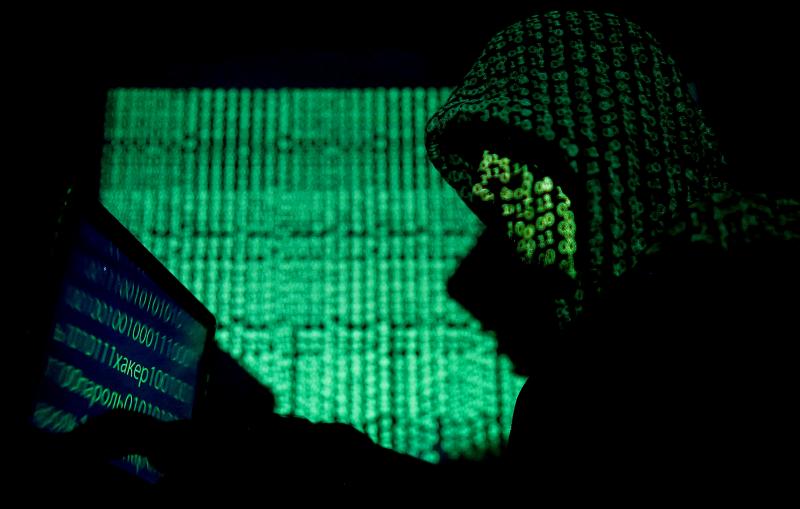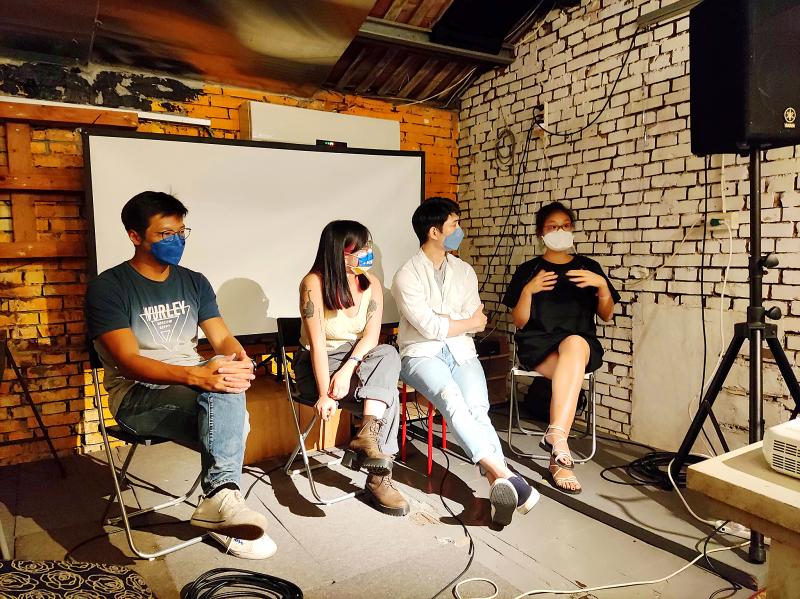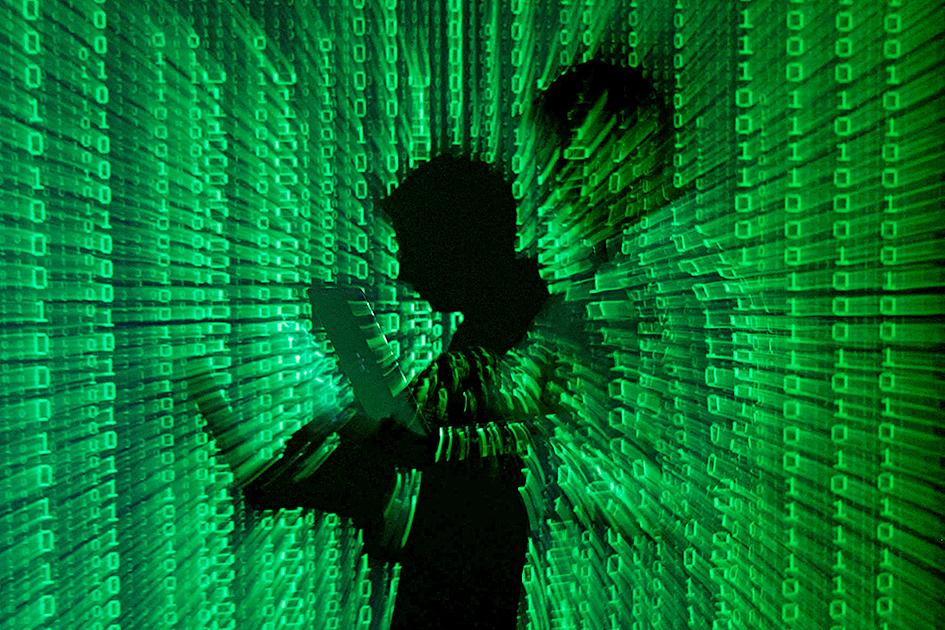What lessons can Taiwan learn from the disinformation campaigns that have surrounded the war in Ukraine? At an Amnesty International Taiwan event in Taipei on Wednesday night, four speakers offered compelling insights into this and related questions.
One of the main takeaways was the observation that disinformation does not exist in a vacuum. Rather, it is part of an information ecosystem that we need to fully understand before we can address the issue of invasive species, as it were.
“It’s not just about an information problem, but an information environment that makes Taiwan a pretty good place for all sorts of exploitation of information manipulation,” says T.H. Schee (徐子涵), a representative of Open Knowledge Taiwan, a community of think-tankers, practitioners and digital enthusiasts who work on incubating open initiatives.

Photo: Reuters
Schee emphasizes that, “preconditions are ripe” in Taiwan for the dissemination of propaganda and falsehoods, in part because of an older generation that relies on “tacit circles of trust” for their information.
“In order to build a healthy environment for them, you need to understand how they trust each other and communicate with their peers,” Schee says. “If they trust messages online, it’s probably because it’s sent by their husbands or wives.”
The kinds of narratives that might play well with such groups fall into several categories, says Jeff Hsu (徐曉強) of IORG, a civilian research organization working to bolster information literacy and counter authoritarianism. Having analyzed over 267,000 texts from social media, statements by Chinese Communist Party (CCP) authorities and CCP-aligned media between November last year and February, IORG has identified four main themes: US bad; Ukraine bad; Russia justified and US untrustworthy.

Photo: James Baron
As an example of the kind of emotive tactic that might be used for the target audience, Hsu mentions a narrative from the third category that cast Russia as spurned husband and Ukraine as the unfaithful wife.
“We found this was the most reported message on [the messaging app] Line,” say Hsu.
The fourth category — namely the inherent untrustworthiness of the US as an ally — also lends itself to appeals designed to trigger the emotions.

Photo: Reuters
“Perhaps the most common narrative is the ‘today Ukraine, tomorrow Taiwan (今日烏克蘭,明日台灣)’ one,” says Hsu. “Last August, when the US conducted their military retreat from Afghanistan, there was a similar slogan,” he says.
LIMITS TO DATA SCRAPING
The point here, says Hsu, is to communicate to Taiwanese that the Americans will not come to the rescue, when “they cannot even fight against the Taliban.”
Hsu believes this idea has now been transposed onto the Ukraine situation.
“It’s almost the same,” he says. “They’re saying the US is not sending soldiers on the ground, they’re just using Ukraine as a pawn and Taiwan is on the same path.”
While Schee has identified similar trends, he believes there are limits to what data alone can tell us.
“One of the hurdles to understanding the problem is the closed ecosystem of Line and Facebook messenger,” he says. “You just can’t scrape data from those two big services. When Line was listed on the New York Stock Exchange four years ago, the number of messages reached about 9.3 billion a day. Think about the scale of the problem.”
Instead, a more comprehensive understanding of who shares what, how they share it and why must be undertaken, if there is any hope of effecting root-and-branch changes.
This chimes with Liya Yu’s (喻俐雅) perspective. The German-Chinese political scientist says more focus must be placed on “the self” in relation to information sources.
“People in our in-group, we consider as part of our identity group, whether it’s political or social — these people to us are very complex and when they give us information, it can seem more valuable,” Yu says.
DEHUMANIZATION PROCESS
Conversely, those outside the group are more easily dismissed or, worse, ultimately dehumanized.
“We only ascribe secondary complex emotions to people in our in-group,” Yu says.
By denying such feelings to people from out-groups, primarily through the language we use, we can remove their agency. This, Yu says, is evident in the way Taiwan and Ukraine are reported, even in “well-meaning” Western media.
“[If] the people have no agency, it doesn’t matter what they think,” Yu says. “Stories that say Taiwan has no self-identity also serve for Taiwanese to dehumanize themselves and not see themselves as equal human beings who can bring about worthy political change.”
Citing the latest research by neuroscientists, which she accepts can be “controversial” at times, Yu says the process of dehumanization on the person engaging in it, “deactivates the prefrontal medial cortex, which is essential for us to mentalize and empathize with others.”
This essentially reduces others to objects.
“If you put me through an fMRI (functional magnetic resonance imaging machine), the way I see you is equivalent to that chair” says Yu. “That has consequences from the brain, to opinions to political behavior.”
Based on this, one comes to understand how “justification of atrocities” is a natural next step in the process.
FRONT AND CENTER
Addressing such atrocities, Aurora Chang (張瓊方) highlights the prevalence of terms such as “so-called” (所謂的) in CCP-friendly media sources.
“People familiar with pro-Beijing media will know this,” says Chang, who has worked as a researcher on disinformation in Taiwan and spoke in her capacity as an organizer and activist with Taiwan Stands with Ukraine group.
“They used it to talk about the massacre in Bucha and to paint these atrocities as false flags by America or media smear campaigns against Russia,” Chang said.
Chang stresses that disinformation can also take more insidious forms that can be harder to tackle. Referring to a recent forum in which a Russia participant “warned us about the perils of trusting Western media blindly” and another featuring a presentation with a slide titled “Russians are also victims,” she calls on people to focus on the “voices and needs” of the people who are suffering.
The natural inclination for balance and nuance makes this tricky, says Chang, but not all narratives deserve airtime.
“As Taiwanese activists who are trying to support Ukraine from a country so different and so far away, it’s really important to center Ukrainian voices,” says Chang. “And due diligence when you’re sharing something — you might not even be doing it intentionally but it’s good to take note of the language that’s used.”

As Donald Trump’s executive order in March led to the shuttering of Voice of America (VOA) — the global broadcaster whose roots date back to the fight against Nazi propaganda — he quickly attracted support from figures not used to aligning themselves with any US administration. Trump had ordered the US Agency for Global Media, the federal agency that funds VOA and other groups promoting independent journalism overseas, to be “eliminated to the maximum extent consistent with applicable law.” The decision suddenly halted programming in 49 languages to more than 425 million people. In Moscow, Margarita Simonyan, the hardline editor-in-chief of the

Six weeks before I embarked on a research mission in Kyoto, I was sitting alone at a bar counter in Melbourne. Next to me, a woman was bragging loudly to a friend: She, too, was heading to Kyoto, I quickly discerned. Except her trip was in four months. And she’d just pulled an all-nighter booking restaurant reservations. As I snooped on the conversation, I broke out in a sweat, panicking because I’d yet to secure a single table. Then I remembered: Eating well in Japan is absolutely not something to lose sleep over. It’s true that the best-known institutions book up faster

The latest Formosa poll released at the end of last month shows confidence in President William Lai (賴清德) plunged 8.1 percent, while satisfaction with the Lai administration fared worse with a drop of 8.5 percent. Those lacking confidence in Lai jumped by 6 percent and dissatisfaction in his administration spiked up 6.7 percent. Confidence in Lai is still strong at 48.6 percent, compared to 43 percent lacking confidence — but this is his worst result overall since he took office. For the first time, dissatisfaction with his administration surpassed satisfaction, 47.3 to 47.1 percent. Though statistically a tie, for most

Though the total area of Penghu isn’t that large, exploring all of it — including its numerous outlying islands — could easily take a couple of weeks. The most remote township accessible by road from Magong City (馬公市) is Siyu (西嶼鄉), and this place alone deserves at least two days to fully appreciate. Whether it’s beaches, architecture, museums, snacks, sunrises or sunsets that attract you, Siyu has something for everyone. Though only 5km from Magong by sea, no ferry service currently exists and it must be reached by a long circuitous route around the main island of Penghu, with the